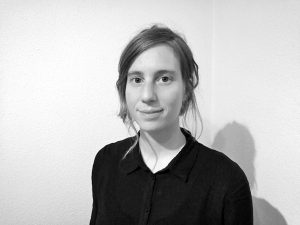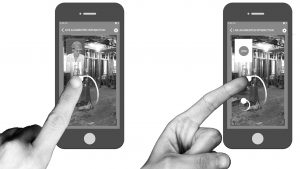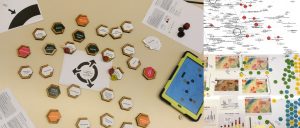Welcome everyone to the first doctoral seminar of the autumn semester!
On the 26.09.19, 16.30-19.30 at Väre R113, led by Professor Lily Díaz doctoral student Jana Pejoska will present her on-going research titled
New Media Design Considerations in Technology-enhanced Learning
Enhancing Communication and Collaboration Through Embodied Experiences
Designers of technology-enhanced learning (TEL) typically investigate how to design technology as an effective vehicle for learning. One of their challenges is to approach design which draws both from knowledge about human cognition as well as from studies that inform about the role of technology in the processes of learning. TEL has been studied for facilitating digital and multimedia literacy; for assessing the learners; for accessing and studying the learning material; as media for learning through inquiry; as media for learning through construction; or as media for learning through communication and collaboration.
In this study, I approached the design investigations in TEL for enhancing communication and collaboration practices for informal learning at work. In this field, I contribute with a design proposal using post-phenomenological theory, embodied experiences and enaction as theoretical approaches to learning, in addition to context-dependent learning paradigms.
I present our two design cases for TEL in physical work contexts, made with a design thinking approach and a research-based design method. With a research-based design method I formulate a hypothesis in the form of prototype, a result of an iterative process arising from contextual inquiries and participatory design workshops. The design outcome, the prototype for an augmented reality application for smartphones, is discussed in the light of improving knowledge sharing through remote communication and collaboration.
In addition to these cases, I discuss other outcomes of these studies, which changed the course of my investigation of design of TEL, towards critical design considerations for technology. Finally, I present Culture Coding, a new design framework for unconventional thinking towards the codes of behavior that guide human-technology relations.
Bio
 Jana Pejoska is a doctoral candidate at the Media Department in the School of Art, Design and Archi at Aalto University. Currently, she is in her 4th year of study and research connected to the Learning Enviroments Research Group, where she has been designing, developing and investigating new media prototypes such as video-conferencing interfaces, wearable device based on body memory, augmented reality for enhancing remote collaboration and informal learning, as well as a virtual reality application design for personal growth. She has a master’s degree in Digital Culture from the University of Jyvaskyla in the topic of educational virtual worlds for children, and a professional background of 15 years in digital media production such as 3D animation, and design and development of serious games.
Jana Pejoska is a doctoral candidate at the Media Department in the School of Art, Design and Archi at Aalto University. Currently, she is in her 4th year of study and research connected to the Learning Enviroments Research Group, where she has been designing, developing and investigating new media prototypes such as video-conferencing interfaces, wearable device based on body memory, augmented reality for enhancing remote collaboration and informal learning, as well as a virtual reality application design for personal growth. She has a master’s degree in Digital Culture from the University of Jyvaskyla in the topic of educational virtual worlds for children, and a professional background of 15 years in digital media production such as 3D animation, and design and development of serious games.
Guest speaker
Georgia Panagiotidou
Using Data Visualisation for Interdisciplinary Sensemaking
Interdisciplinary collaboration describes a situation in which two or more scientific disciplines working on related problems try to interoperate to come to common understandings. In light of past shortcomings to address complex societal issues, interdisciplinary collaboration is currently employed to promote innovation and to discover holistic solutions. At the same time, ten years into the fourth wave of science, computational methods and data visualisation analysis have been established in the practise of most research paradigms from natural sciences to the humanities. Still, data collaboration comes coupled with epistemological tensions related to misalignment of interests or scientific paradigms; but also very practical tensions related to infrastructure, methodologies, ownership and even representation. My work investigates how such data issues manifest within an archaeological research project and subsequently how we can design or adapt visualisation infrastructure to address them. By organising a series of 10 interventions divided between disciplinary/interdisciplinary and data/theory-driven I was able to approach the first sub question and see how data is being negotiated in practical settings. Moreover, in an attempt to externalise the collaboration to third parties, I attempted to capture the thematic variation of the interventions as evolving node-link diagrams. Overall, my findings so far, indicate that many of the divides in data-driven interdisciplinarity are parallel to metadata and contextualisation discussions taking place in digital humanities and critical data studies. In this presentation I will discuss my methodological choices in light of the findings as well as outline how I intend to continue on the second half of my research endeavour.
Bio
 Georgia Panagiotidou is a Ph.D researcher in KU Leuven where she is a member of the Research[x]Design group and the Sagalassos Archaeological Research project. Her work focuses on the design and appropriation of data visualisation for cross-disciplinary collaboration and specifically in the digital humanities. She holds a BSc. in Informatics and Telecommunications from the National and Kapodistrian University of Athens (2011) and a MA in New Media from Aalto University (2015). After graduation and before starting in KU Leuven, she worked in the field of civic technology as a data specialist for organizations including Open Knowledge Finland and the Finish newspaper, Helsingin Sanomat.
Georgia Panagiotidou is a Ph.D researcher in KU Leuven where she is a member of the Research[x]Design group and the Sagalassos Archaeological Research project. Her work focuses on the design and appropriation of data visualisation for cross-disciplinary collaboration and specifically in the digital humanities. She holds a BSc. in Informatics and Telecommunications from the National and Kapodistrian University of Athens (2011) and a MA in New Media from Aalto University (2015). After graduation and before starting in KU Leuven, she worked in the field of civic technology as a data specialist for organizations including Open Knowledge Finland and the Finish newspaper, Helsingin Sanomat.


